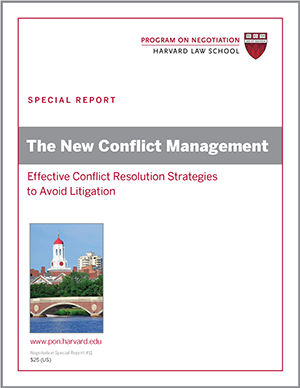
Adapted from “The Lasting Influence of Emotions,” first published in the April 2010 issue of Negotiation.
Psychologists have long known that an emotion triggered in one realm—anger over an argument at home, for example—can affect how we behave in a subsequent situation, including a negotiation.
Such incidental, or unrelated, emotions might influence how fully we trust someone or how much we’re willing to pay for a product.
Incidental emotions can even continue to affect our decisions when we’re in a more neutral state, according to new research by professors Eduardo B. Andrade of the University of California at Berkeley and Dan Ariely of Duke University.
In their experiment, college students who were induced to feel angry (by watching a film clip) were more likely to reject an unfair allocation of money from a partner than were students who were induced to feel happy.
More interestingly, even after their anger had subsided, the students who had been induced to feel angry displayed a consistent preference for fairness when presented with the chance to decide how much money to give to a different partner.
It seems the desire to behave consistently over time could cause us to be influenced by emotions we no longer feel.
This research provides early evidence that even a mild emotional encounter prior to or during a negotiation could influence your bargaining behavior far into the future.
To lessen this effect, it may help to take stock of such feelings as they arise and consider their source.
Resource: “The Enduring Impact of Transient Emotions on Decision Making,” by Eduardo B. Andrade and Dan Ariely. Organizational Behavior and Human Decision Processes, 2009.





This is a valuable example of rigorous research confirming the influence of emotional state on negotiation behaviour, an influence that all good negotiators understand. In my research-based book (Tug of War: The Tension Concept and the Art of International Negotiation)I summarise the influence as follows: “Negotiators are not automatons. They carry unique experience…that influences the way they see and are seen, and the way they negotiate. If a diplomat is feeling venomous because her husband has bolted, this is likely to affect her negotiation about state matters….[She will make a] judgement on the relationship as it stands, how it might end up, and [should consider] how her diagnosis and prognosis might influence her diplomatic negotiation” (p. 268).